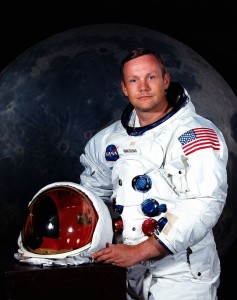As recently as 50 years ago, the idea of putting a man on the moon was viewed as—no pun intended—an astronomical impossibility.

In mid-1961, President John F. Kennedy announced a goal to see an American safely to the moon by the end of the decade, thus adding new pressure to the “Space Race” against the former Soviet Union during the Cold War.
Even after JFK’s assassination, his ambitious goal was realized on July 20, 1969. The commander of NASA’s ship Apollo 11, Neil Armstrong, became the first person to set foot on the moon.
And, on Aug. 25, 2012, Neil Armstrong passed away in Cincinnati.
“As long as there are history books,” NASA Administrator Charles Bolden said, “Neil Armstrong will be included in them.”
Armstrong is considered a legend of space exploration and an American hero. He was only 38 years old when the entire world watched him change history by taking the first steps outside of a spacecraft.
On July 20, 1969, Armstrong and fellow astronauts ‘Buzz’ Aldrin and Michael Collins landed on the moon after four days and 250,000 miles of space travel.
Armstrong and Aldrin spent over two hours on the surface of the moon, during which they placed an American flag and collected samples for analysis back on Earth. None of the three men returned to space after the Apollo 11 mission.
The USSR never did put a man on the moon. There have only been 12 people to set foot on the moon, all of them Americans from six separate Apollo missions between 1969 and 1972.
There have been 23 unmanned landings in the years since. In 2005, the National Aeronautics and Space Administration (NASA) told National Geographic that they would like to return humans to the moon by 2018.
Neil Armstrong, the first member of an extremely exclusive group of legends, passed away at 82 years old due to “complications resulting from cardiovascular procedures,” according to his family.
He was a Korean War veteran and also a recipient of the Presidential Medal of Freedom, the highest non-military award offered in the U.S, for his role in the Apollo 11 mission. Despite being hailed as a national hero, Armstrong was, by all accounts, a humble and modest man who preferred teaching and spending time with his family to interviews and fame.
Most are familiar with Armstrong’s famous quote uttered while walking on the surface of the moon, “That’s one small step for (a) man, one giant leap for mankind.”
Many media outlets and bloggers are calling his death “one giant loss for mankind.”
Both President Barack Obama and GOP nominee Mitt Romney agree with this claim. President Obama ordered all flags in the nation to be at half-mast Friday, Aug. 31, for Armstrong’s funeral.
In a press release, he also summed up the view of pretty much every news story and social network post in the nation by stating that Armstrong was one of “the greatest American heroes…of all time.”













